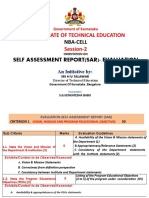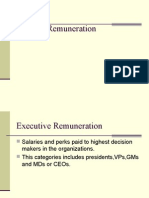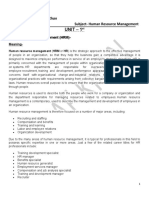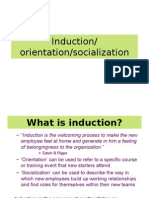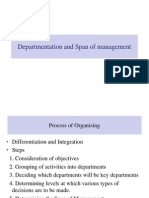Compensation Management
Uploaded by
javidimsCompensation Management
Uploaded by
javidimsJAVID KHAN IMS, UOP
COMPENSATION MANAGEMENT
HRM: HRM stands for human resources management and it may be define as, The process of planning, organizing, leading and controlling human resources effectively and efficiently is called human resource management. OR Optimum utilization of human resource is called human resource management. OR The management of people to achieve individual behavior and performances that will enhance an organizations effectiveness. FUNCTIONS OF HRM: There are four main functions of HRM which are below, (1) Acquisition function (Recruitment and selection). (2) Training and development (3) Motivation function (4) Maintenance function (1).Acquisition function: Acquisition is concerned with attracting and acquiring human resources. It includes what strategies organization should adopt for recruiting and selection. (2).Training and development: This function is concerned with providing training and development to human resources. Training is risky investment for the organization. (3).Motivation function: This function is concerned with motivating employs through different ways. It ask how to motivate employs. (4).Maintenance Function: As the name implies, the objective of this phase is to put into place activities that will help retain productive employees. HRM must work to ensure that the working environment is safe and healthy; caring for employees' well-being has a major effect on their commitment. HRM must also realize that any problem an employee faces in his or her personal life will ultimately be brought into the workplace. Well organized compensation management is also necessary for maintenance which we will discuss in detail in this subject. PERSPECTIVE OF STUDYING COMPENSATION MANAGEMENT: Different people have different perspective about compensation and it is not the same thing to everyone. Literal means of compensation is pay back amount or amount/money you give back to employees. From employer perspective it is the expected return than an employer give to an employee for his services rendered or work done.
1
JAVID KHAN IMS, UOP
From employee perspective it is the expected return that an employee receives from employer for services rendered and work done. So it is a kind of return which both the parties share. Now from different perspective (1).SOCIETY: (justice). Compensation is a symbolic representation of justice of justice, equity and fairness in a society. Good compensation management in a society means that peoples in a certain society or organization are treated fairly. So most people see pay as a measure of justice. For example, a comparison of earning between men and women highlights what may consider inequalities in pay decision. Benefits may also be seen as a reflection of justice in a society. Almost 46 million people in the United States (16% of the population) do not have health insurance. 80% of these are employees (or dependent of employees) working in a small business. (2).EMPLOYER: it may be one of the below from the employer perspective A. Cost B. Managing employee behavior From employer perspective it is cost which an employer has to afford. So according to employer it is nothing but is just a cost. Beyond treating pay as an expense, an employer also use to influence and manage employees behavior. They ways employees are paid affects the (+IVE) Quality of their work Their attitudes towards customers Their willingness to be flexible Their willingness to learn new skills Their willingness to suggest innovations. (-IVE) Employees active participation in union or legal action against the employer. If employer pay reasonable payment so employees work is qualitative and show positive attitudes towards customers due to which customers are satisfied. Employees are also willing for flexibility, learning new skills and suggesting and accepting innovation if their pay is good. On the other hand if pay is not good so employees take active participation in unions etc which is negative effect. Employees will protest for not having fair compensation. (3).EMPLOYEE: from employee perspective it is may be an Entitlement Honorarium Reward Exceeding Amount Return Deserving Amount
JAVID KHAN IMS, UOP
Entitlement is a kind of honorarium. Employees were receiving salary as an entitlement in the past but with the passage of time it came to know that salary is not an entitlement. Reward means the amount which is given extra for motivation and return is the deserving amount which is given for work done and services rendered. (4).GLOBAL: In todays china the word Dai Yu is used and refers to compensation. It refers to how you are being treated-your wages, benefits, training opportunities and so on. In china when people talk about compensation, they ask each other about the Dai Yu in their companies. In Japan the word Kyuyo were used to refer to compensation. It is the combination of two characters (kyu and yo), both means giving something. According to this word, compensation is an honor but with the passage of time this concept replaced by a new concept and terminology. In todays Japan the word Hou-syu refers to compensation. Hou-syu means reward and has no association with the honor. Japan is just an example but at the beginning all Asian countries were considered that compensation is an honor. These contrasting ideas about compensation, multiple views (social, employer, employees, and even global) and multiple meanings (returns, rewards, entitlement) add richness to the topic. But they can also cause confusion unless everyone is talking about the same thing. So lets define what we mean by compensation. Or pay.
JAVID KHAN IMS, UOP
COMPENSATION:
Compensation refers to all form of financial and non financial return which employees received in term of employment relationship. Compensation is the total amount of the monetary and non-monetary pay provided by an employer to an employee for services rendered (i.e., time, effort and skill) and work performed.
FORMS OF COMPENSATION:
Total Return
Financial
Total Compensation
Indirect
Relational Return
Non-financial
Recognition and Status Employment Security Challenging Work Direct
Cash Compensation
Indirect cmpnston
Benefits
Learning Opportunities
Base Income protection Merit/Cost of living Work/life balance Short term incentive Allowances Long term incentive
TOTAL RETURN = Financial Return + Non-Financial Return.
Total return is divided into two main categories i.e. total compensation and relational returns. Total compensation is financial in nature and a relational return is non-financial in nature.
JAVID KHAN IMS, UOP
Total compensation is further divided into two categories i.e. Cash compensation and Benefits. Cash compensation is direct compensation because it is directly paid to the employees in the form of cash and benefit id indirect compensation. Cash compensation and benefits have the following forms. BASE WAGE: (Cash compensation):
Base wage is also called basic salary. Basic wage determine the value of work which is more important and which one is not important for the organization. Basic pay reflects worth of the job. Wage is basically cash compensation. Basic pay is also important for calculating allowances. We receive 45% house rant and 15% medical allowances of the basic pay.
MERIT PAY/COST OF LIVING ADJUSTMENT: (Cash compensation):
This is another form of compensation. It is the periodic adjustment to base wage. These adjustments are made through cost of living adjustment and merit pay. Merit pay or merit increases is the periodic adjustment or increment to the base pay on the basis of performance. It is given on the basis of past work behavior. Outstanding employees receive 6 to 8 percent increases in the basic pay while average one receives 3 to 4 percent annually. Merit pay is a kind advantage that employee enjoy by meeting required standard. It is not given for exceeding the standard. If employee exceeds his standard so he will be rewarded. Reward is certain and you know about it but merit pay is not certain and you dont know about it. Merit pay is given for past performance but reward is given for future performance for bringing motivation. Cost of living adjustment is the periodic adjustment to the base pay on the basis of inflation and not on the basis of performances. Cost of living adjustment gives the same percentage increases to all the employees regardless of their performances.
SHORT TERM INCENTIVE: (Cash compensation): Incentive may call rewards and it is also an acknowledgement. Incentives are the additional
benefits which are given to employees on the basis of performances but different then merit pay. (a) Incentive do not increases the base wage or pay and must be re-earned for each pay period. Incentive is only re-earned if your performance is good and if not so you will be not entitled for the next year (b)The potential size of the incentive payment is generally known before the appraisal period while merit pay evaluate the past performance and then decision is taken regarding the size of that amount. So simply it means that the amount of incentive is known before the appraisal period while the amount of merit pay is not known. Merit program analyze and evaluate your performance where incentive is given before analysis.
LONG-TERM INCENTIVE: (Cash compensation):
long term incentive include stock option etc. the belief underlying stock option is that employees with a financial stake in the organization will focus on long-term financial objectives i.e. return on investment, market share, return on net asset etc. 5
JAVID KHAN IMS, UOP
INCOME PROTECTION: (Benefits):
Income protection is also a form of compensation. Income protection is the compulsory deduction from salary to protect some income of the employees for old age. Income protection is legally required. Medical insurance, life insurance and saving plans are the common benefits which employees received as compensation from organization. If employees spend all their money or face huge loss so income protection program is there to help him C.P.F & G.P.F (combine provident fund & general provident fund) is deducted for future use and we can call it income protection. Provincial government hires employees for 25 years. The government deducts some amount from the salary of employees which is goes to C.P.F. if 1700 is deducted from the salary of the employees so 1700 is also added from government side. This amount cannot be draw before retirement and after retirement employees receive lump sum amount. In case of C.P.F employees do not have any other monthly payment. Federal government deduct from the pay of government servant which goes to G.P.F. organization do not contribute to G.P. Fund. This amount can also be draw before the retirement. In case of G.P.F employees have monthly payment? Provincial job = C.P.F Federal job = G.P.F C.P.F: Organizations also contribute to C.P.F and you cannot draw it before your retirement. G.P.F: Organizations do not contribute in G.P.F and you can draw it before your retirement. WORK/LIFE BALANCE: (benefits): Work life focus are the different programs which help employees to better integrate their work and life responsibility include time away from work e.g. paid leave, flexible working hour etc. 20 casual leaves are allowed to teachers in universities. Leaves may be earned and unearned. It also include flexible working schedule. Some time employees claim for nothing but for flexible working hours.
ALLOWANCES: (benefits):
An amount that is allowed or granted Allowance refers to a sum of money allotted or granted for a particular purpose, as for expenses: her allowance for the business trip was $200. Allowances are given in case of short supply. In Vietnam and in china (dormitories and apartments) and transportation allowances are frequently parts of the pay package because of short supply. After the world war-two, there was shortage of food and some Japanese companies still continue to offer a rice allowance.
You might also like
- BB211 - Chapter 8 - Internal CommunicationsNo ratings yetBB211 - Chapter 8 - Internal Communications27 pages
- 2017 Task 6.2 Bsbldr402 Bsbdiv301 Assessment v20% (4)2017 Task 6.2 Bsbldr402 Bsbdiv301 Assessment v25 pages
- Directorate of Technical Education NBA-Cell Session-1 Self Assessment Report (Sar) - FillingNo ratings yetDirectorate of Technical Education NBA-Cell Session-1 Self Assessment Report (Sar) - Filling42 pages
- Directorate of Technical Education Session-2: Nba-CellNo ratings yetDirectorate of Technical Education Session-2: Nba-Cell37 pages
- Sub: - Topic: - Sub Topic:-Prepared By: - Roll No: - Subject ToNo ratings yetSub: - Topic: - Sub Topic:-Prepared By: - Roll No: - Subject To6 pages
- U-3 UNIT 3 INTERPERSONAL BEHAVIOR 8 HrsNo ratings yetU-3 UNIT 3 INTERPERSONAL BEHAVIOR 8 Hrs26 pages
- W9 MODULE 9 Total Rewards Management - PPTNo ratings yetW9 MODULE 9 Total Rewards Management - PPT8 pages
- Compensation and Benefit Management Module Hand BookNo ratings yetCompensation and Benefit Management Module Hand Book63 pages
- Perfomence Appriasal Maha Cement-21.11.20120% (1)Perfomence Appriasal Maha Cement-21.11.201261 pages
- HR AUDIT, Purpose, Areas of Audit and ApproachesNo ratings yetHR AUDIT, Purpose, Areas of Audit and Approaches18 pages
- HR Audit: Kirti Shivakumar Mats School of BusinessNo ratings yetHR Audit: Kirti Shivakumar Mats School of Business13 pages
- Pay Equity Internal and External Conside PDFNo ratings yetPay Equity Internal and External Conside PDF9 pages
- Ed Ebreo - Maintaining Discipline in The Workplace WorkshopNo ratings yetEd Ebreo - Maintaining Discipline in The Workplace Workshop5 pages
- Job Questionnaire: Approval Signatures (Typed Names Will Suffice)No ratings yetJob Questionnaire: Approval Signatures (Typed Names Will Suffice)13 pages
- Compensation and Benefits AdministrationNo ratings yetCompensation and Benefits Administration4 pages
- Human Resources Management Full Note BbaNo ratings yetHuman Resources Management Full Note Bba54 pages
- Human Resource Management: Submitted To: Submitted by100% (1)Human Resource Management: Submitted To: Submitted by40 pages
- Employee Grievances: Prepared By:Jarmonilla, John B. Lubang, John Patrickl100% (1)Employee Grievances: Prepared By:Jarmonilla, John B. Lubang, John Patrickl23 pages
- Supreme Court: Manansala and Manansala For Appellants. Ramon L. Resurreccion For AppelleeNo ratings yetSupreme Court: Manansala and Manansala For Appellants. Ramon L. Resurreccion For Appellee4 pages
- Tenth Edition: Building Pay Structures That Recognize Employee ContributionsNo ratings yetTenth Edition: Building Pay Structures That Recognize Employee Contributions52 pages
- 11LoI - SmartBrains - HCL - Process CHERUB EBENEZERNo ratings yet11LoI - SmartBrains - HCL - Process CHERUB EBENEZER6 pages
- SALARY_CHAPTER_DT_AY_2024_25_FA_2023_INTER_LEVEL_STUDENTs_21st_EditionNo ratings yetSALARY_CHAPTER_DT_AY_2024_25_FA_2023_INTER_LEVEL_STUDENTs_21st_Edition104 pages
- Germany General Manager Salary & Benefits ReportNo ratings yetGermany General Manager Salary & Benefits Report9 pages
- Finance Guidelines Manual For Local Departments of Social Services - VA DSS - Oct 2009No ratings yetFinance Guidelines Manual For Local Departments of Social Services - VA DSS - Oct 2009426 pages
- Chemistry - Survey of Industrial Chemistry - Chenier75% (4)Chemistry - Survey of Industrial Chemistry - Chenier538 pages
- Welcome: Myoun Shin India Automotive PVT LTDNo ratings yetWelcome: Myoun Shin India Automotive PVT LTD14 pages
- Directorate of Technical Education NBA-Cell Session-1 Self Assessment Report (Sar) - FillingDirectorate of Technical Education NBA-Cell Session-1 Self Assessment Report (Sar) - Filling
- Directorate of Technical Education Session-2: Nba-CellDirectorate of Technical Education Session-2: Nba-Cell
- Sub: - Topic: - Sub Topic:-Prepared By: - Roll No: - Subject ToSub: - Topic: - Sub Topic:-Prepared By: - Roll No: - Subject To
- Compensation and Benefit Management Module Hand BookCompensation and Benefit Management Module Hand Book
- HR Audit: Kirti Shivakumar Mats School of BusinessHR Audit: Kirti Shivakumar Mats School of Business
- Ed Ebreo - Maintaining Discipline in The Workplace WorkshopEd Ebreo - Maintaining Discipline in The Workplace Workshop
- Job Questionnaire: Approval Signatures (Typed Names Will Suffice)Job Questionnaire: Approval Signatures (Typed Names Will Suffice)
- Human Resource Management: Submitted To: Submitted byHuman Resource Management: Submitted To: Submitted by
- Employee Grievances: Prepared By:Jarmonilla, John B. Lubang, John PatricklEmployee Grievances: Prepared By:Jarmonilla, John B. Lubang, John Patrickl
- Managing Reorganizations in the Public SectorFrom EverandManaging Reorganizations in the Public Sector
- Supreme Court: Manansala and Manansala For Appellants. Ramon L. Resurreccion For AppelleeSupreme Court: Manansala and Manansala For Appellants. Ramon L. Resurreccion For Appellee
- Tenth Edition: Building Pay Structures That Recognize Employee ContributionsTenth Edition: Building Pay Structures That Recognize Employee Contributions
- 11LoI - SmartBrains - HCL - Process CHERUB EBENEZER11LoI - SmartBrains - HCL - Process CHERUB EBENEZER
- SALARY_CHAPTER_DT_AY_2024_25_FA_2023_INTER_LEVEL_STUDENTs_21st_EditionSALARY_CHAPTER_DT_AY_2024_25_FA_2023_INTER_LEVEL_STUDENTs_21st_Edition
- Finance Guidelines Manual For Local Departments of Social Services - VA DSS - Oct 2009Finance Guidelines Manual For Local Departments of Social Services - VA DSS - Oct 2009
- Chemistry - Survey of Industrial Chemistry - ChenierChemistry - Survey of Industrial Chemistry - Chenier










